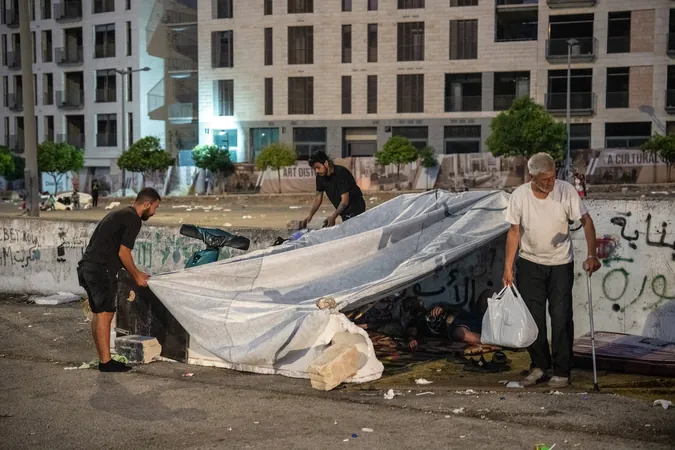
Israel Unleashes Widespread Airstrikes in Yemen, Gaza, and Lebanon Amid Regional Tensions
2024-09-29
Author: Liam
In a shocking escalation of military action, Israeli warplanes struck targets in Yemen, Gaza, and Lebanon on Sunday, intensifying a brutal campaign amid rising tensions following the assassination of key Hezbollah figure, Hassan Nasrallah. The Israel Defense Forces (IDF) have confirmed that their airstrikes targeted strategic Houthi positions in Yemen, including critical infrastructure like power plants and oil-importing seaports.
Simultaneously, the relentless assault on Lebanon continued, with the IDF claiming responsibility for the elimination of Nabil Kaouk, a senior member of Hezbollah’s central council, just a day after Nasrallah's unprecedented death in Beirut. This series of strategic attacks represents a significant blow to Hezbollah’s military capabilities and its ongoing conflict with Israel.
The aftermath of these airstrikes has resulted in tragic consequences for civilians, with countless lives lost across Lebanon. Reports indicate that approximately 400,000 people have been displaced in southern Lebanon alone since the resurgence of violence, with many fleeing towards the capital, Beirut, creating a humanitarian crisis.
Residents, like Carolina Riskala, a café owner near Naqoura, express sheer desperation. She described the harrowing conditions of local villages left without essential services due to fuel shortages, saying, “Everyone is talking about an invasion. My country is bleeding.” Similar harrowing stories are emerging from across the region as families desperately seek refuge from the violence.
The hostilities, which reignited on October 8, began after Hezbollah launched rockets into northern Israel, reportedly in solidarity with Hamas, which had attacked Israel a day earlier. Israel's military response aims to secure the safety of its citizens and may lead to further prolonged confrontations, raising fears of a wider conflict involving regional powers.
Highlighting its operational superiority, Israeli military spokespersons noted that a significant aerial operation targeted Yemeni ports under Houthi control, involving dozens of warplanes, indicating a bold expansion of military engagements. This is part of a broader Israeli strategy to exert pressure on Iranian-aligned groups across the Middle East.
In Gaza, the situation remains dire, as confirmed Israeli death tolls surpass 41,600 Palestinians, reflecting the devastating toll of the ongoing conflict. Eyewitness accounts detail civilian areas being targeted, creating international scrutiny and complicating efforts for a ceasefire. Amid the violence, over 200 individuals remain hostages in Gaza, with fears mounting for their welfare.
Moreover, political analysts speculate that Israeli Prime Minister Benjamin Netanyahu's aggressive military strategy may be a calculated move in light of U.S. domestic politics, especially considering the upcoming presidential elections. Experts suggest that any escalation could compel the U.S. to intervene, as its longstanding alliance with Israel faces scrutiny during a potentially volatile election cycle.
General Herzi Halevi of the Israeli Defense Forces emphasized the ongoing campaign against Hezbollah, asserting, “Hezbollah has been hit very hard... we need to keep hitting Hezbollah hard.” Yet, this military escalation raises alarm about the impact on Lebanese civilians, who are already feeling the crux of the humanitarian crisis.
As families in Lebanon stack their cars for shelter or flee to crowded parks for safety, the international community watches closely, with several embassies urging citizens to evacuate amidst escalating threats. Reports of chaos at Beirut's Hariri airport showcase the desperation of those trying to escape the violence.
Tragically, with the loss of Nasrallah, who led Hezbollah for over three decades, the region braces for significant changes in leadership and potential realignments of power, with his funeral anticipated to draw vast numbers of supporters.
With tensions peaking and humanitarian conditions worsening, the world awaits what the coming days will bring, as the specter of expanded conflict looms large over the already war-torn regions. The situation remains fluid, urging immediate humanitarian intervention and global diplomatic efforts to halt the violence before further tragedy strikes.









 Brasil (PT)
Brasil (PT)
 Canada (EN)
Canada (EN)
 Chile (ES)
Chile (ES)
 España (ES)
España (ES)
 France (FR)
France (FR)
 Hong Kong (EN)
Hong Kong (EN)
 Italia (IT)
Italia (IT)
 日本 (JA)
日本 (JA)
 Magyarország (HU)
Magyarország (HU)
 Norge (NO)
Norge (NO)
 Polska (PL)
Polska (PL)
 Schweiz (DE)
Schweiz (DE)
 Singapore (EN)
Singapore (EN)
 Sverige (SV)
Sverige (SV)
 Suomi (FI)
Suomi (FI)
 Türkiye (TR)
Türkiye (TR)